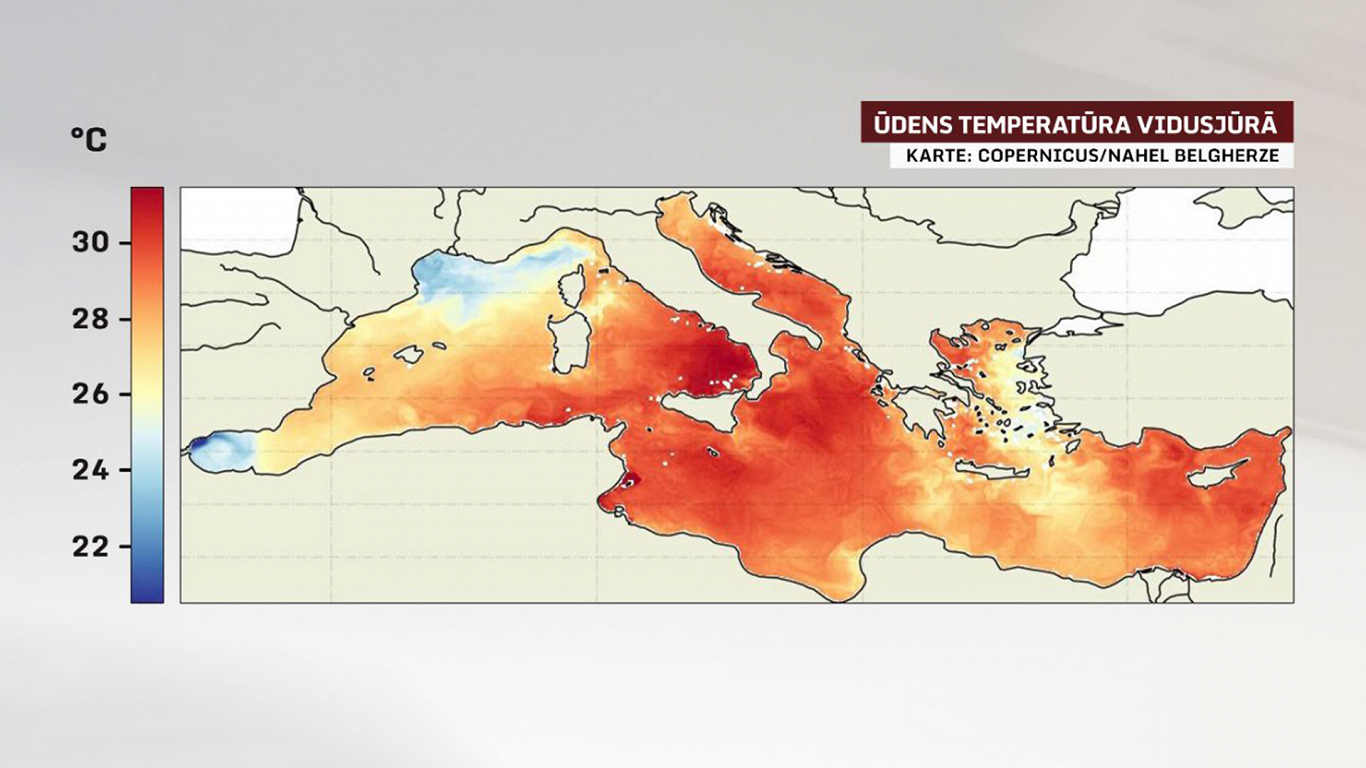IN SHORT:
Summer in the Mediterranean region started with unusually cool and wet weather.
Later, there was a short-term heat, which turned into a persistent 35…40 degree heat.
This week, the water temperature in the Mediterranean reached a historical heat record.
Scientists are raising the alarm that the increase in temperature may significantly change the Mediterranean ecosystem.
Due to the high heat, devastating fires broke out in many places in Southern Europe.
Experts: Climate change will make extreme weather more frequent.
Forecasters: It is unlikely that the temperature in Latvia will reach 30 degrees in the near future.
A significant temperature jump in the Mediterranean region
This summer in the Mediterranean region started with unusually cool and even wet weather. However, already in July the situation changed. At first, the heat appeared temporarily, later the heat of 35, 40 and even over 45 degrees became persistent. And devastating fires broke out in many places.
This week, the water temperature in the Mediterranean reached a historical record – an average of 28.4 degrees. The highest water temperature was right in the central Mediterranean, where the water was as warm as 32.5 degrees. On the coast of France and Spain, the water temperature is around 20…24 degrees, which does not mean cool water, but a temperature within the normal range.
Photo: Latvian Television
Scientists are raising the alarm that the increase in temperature in the Mediterranean Sea may significantly change the marine ecosystem and the economic activity related to it, as well as further intensify climate change.
Air temperature records for this heat wave have also been set in the Mediterranean region. For example, 49 degrees was recorded in Tunis, the capital of Tunisia. In Italy, the greatest heat was in Sardinia and the island of Sicily, where the air temperature reached 48 degrees. In Greece, just south of Athens, it was 46.4 degrees this week. These are extreme weather conditions, meteorologists emphasized.
Photo: Latvian Television
Experts: Climate change will make extreme weather more frequent
The water around the Mediterranean basin was not as warm as it is now 15 or 20 years ago. On the other hand, in recent summers – from the middle of July until the end of August – the water remains warm at 27 and 28 degrees.
The warm water warms the air and is often the cause of heavy rains and other extreme phenomena.
In the last two weeks, the record for the largest hailstones in Europe has been broken twice – it happened precisely in Italy, where the air and water temperatures were among the highest. Near Venice, hailstones reached 19 centimeters in diameter. Hail also wreaked havoc in Austria, Croatia, Serbia and Slovenia and is directly linked to global warming and climate change.
Slovenia’s Minister of Natural Resources and Spatial Planning, Uroš Brežan, stated: “This year we have extreme weather again, such as sudden floods, and it is clear that we will have to live with them in the future. We have to adapt to life in climate change very seriously.”
On the other hand, in several countries of the region and on islands in the Mediterranean, devastating fires have broken out in dry conditions. These have happened in Greece, also in several of its islands, ruining popular tourist destinations, as well as in Tunisia, where it becomes too hot for people to stay and it is difficult to breathe the smoky air.
Laura Krūmiņa, head of the Forecasting Department of the Latvian Center for Environmental Geology and Meteorology (LVĜMC), said: “The El Niño phenomenon has returned again. It is an increased water temperature in the Pacific Ocean, at equatorial latitudes, which has a global impact on the overall air temperature. A lot of direct solar radiation, because the clouds would not allow the air temperature to rise as much. And it is also summer in the Northern Hemisphere. The day is longer than the night. The period when the sun shines is also longer. All these factors have contributed to the unfavorable situation that has developed and quite long persisted in southern Europe.”
Jānis Rozītis, director of the World Wide Fund for Nature, said: “This definitely coincides with scientific predictions about how climate change will proceed. Gradually, it is the south, as we see. But gradually, gradually, we will experience these fluctuations and these anomalies in Latvia as well. This means, that it’s droughts. It’s sudden, massive rainfall. It’s heat waves. Storms and weather that we’re going to have to live with in the future.”
Forecasters: It is unlikely that the temperature in Latvia will reach 30 degrees in the near future
The water temperature in Jurmala’s official swimming areas was 17 degrees on Thursday. Some vacationers also swam in the sea, but in general the weather cannot be called warm or hot.
LVĜMC emphasized that there is little probability that the air temperature will soon reach 30 degrees in Latvia. There could be such warm individual days in August, but not for a long time.
This is also an effect of climate change. Instead of heat, other deviations from the norm are expected.
LVĜMC representative Krūmiņa stated: “There are these extremes in one direction or the other. It is also a consequence of this climate change that it is so intense. Yes, if such very intense heat waves prevail in Europe, then of course for those who have planned their vacations in such a period in Southern Europe, well, they are practically ruined. We in Eastern Europe, on the Baltic Sea, can be a place that could be used if there was a suitable offer to receive tourists in this season.”
The World Wide Fund for Nature predicts not only that the cooler weather could become more attractive for tourism, but also for living. Rozītis named island countries, certain regions of Africa, the Asian side, and Afghanistan as examples.
“Most definitely these countries will soon be uninhabitable. And that is why there is currently a discussion that these climate refugees and military conflicts could only increase. And the climate refugees could range from 500,000 to even a billion. We will be more attractive with our 20 degrees,” expressed A rose.
Typo?
Highlight the text and press Ctrl+Enter to send the corrected text fragment to the editor!
Highlight the text and press the Report an error button to send the corrected text fragment to the editor!
Report a bug
2023-07-27 19:52:28
#MAP #Heat #waves #Southern #Europe #significantly #heated #Mediterranean #Sea


